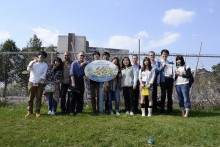By Nicholas Feinig
From April 30 to May 8, the Asian Institute at the Munk School of Global Affairs, University of Toronto, played host to the Osaka University RESPECT (Revitalizing and Enriching Society through Pluralism, Equity, and Cultural Transformation) Program. In collaboration with a team of graduate student researchers from the University of Toronto, graduate students from Osaka participated in a combination of special seminars and off-campus activities held across Toronto in order to generate a comparative framework for further studies of multiculturalism in the Japanese context. The program was structured around three core clusters, each attending to a different set of issues Toronto faces as a city renowned for its diversity.
The first cluster, conducted by the Department of Anthropology’s Professor Bonnie McElhinny, provided students with an introduction to critiques of Canadian multiculturalism that draw on anti-racist and anti-colonial perspectives. Under the guidance of Dr. Sharon Kelly, students were led on a walking tour of Regent Park, a public housing project that has been criticized for its poor design and segregation from the rest of the city. The cluster concluded with a visit to the Native Canadian Centre and a bus tour of pre-contact and historical landmarks in Toronto, sparking conversation concerning ongoing struggles with Canada’s colonial legacy. Cluster two, led by the Department of Anthropology’s Professor Girish Daswani, focused on the practices of transnational “home-making” and the role of religion in diasporic connection. In a session conducted in conjunction with the Department of Geography’s Professor Suzanna Bunce, students were given the opportunity to participate in songs of worship and prayer at a Ghanaian Pentecostal Church. Following the service, the group visited “the Point” and “East Scarborough Storefront” community centres to gain insight into multicultural community planning, development, and engagement. The final cluster, overseen by Asian Institute Director Professor Joshua Barker, was built around a case study of Kensington Market. Through fieldwork sessions conducted in the market, students applied ethnographic methods to analyze urban infrastructures as sites of political contestation. Osaka students interviewed diverse community members, from restauranteurs to barbers, to learn more about the history of immigration in the neighbourhood and the unique social and economic relationships that community members work tirelessly to preserve. The group spoke with Dominique Russell, a representative of the organization “Friends of Kensington Market,” who highlighted the community’s ongoing struggles with gentrification and intrusive city ordinances.
The RESPECT Program culminated in a day-long joint graduate student workshop featuring paper presentations from both Osaka University and University of Toronto students. Contrasting their experience in Toronto with situated case studies lifted from their work in Japan, Osaka students drew fascinating parallels between the concept ofkyosei, intimately tied to the discourse of diversity in the Japanese context, and the way in which “multiculturalism” has been leveraged by political movements in Canada. Graduate student researchers from the University of Toronto presented their own observations from time spent with the Osaka team in the field, reflecting on the ways in which interactions with and insights offered by Japanese students unsettled the supposed “universality” of diversity as a principle of co-existence in liberal-democratic contexts. Presentations from Department of Anthropology graduate students Arie Molema, Joey Youssef, Johanna Pokorny, and Matthew Medeiros enriched the discussion with ethnographic evidence drawn from Canada’s ongoing Truth and Reconciliation Commission, transnational spaces of worship in Egypt and California, the classrooms of the Toronto District School Board, and the offices of neuroscientists.
